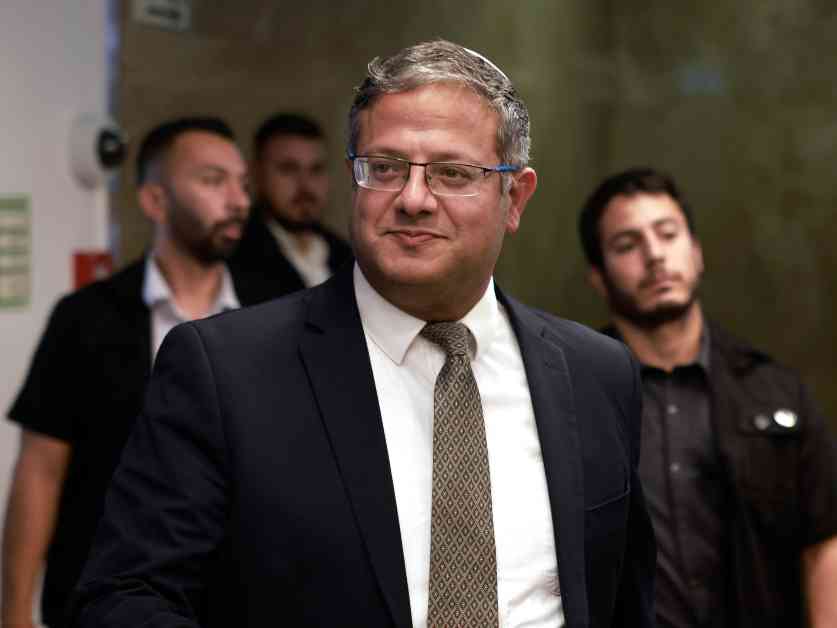Israeli Minister Ben-Gvir Sparks Controversy with Plans to Build Synagogue at Al-Aqsa Compound
A recent statement made by Israeli National Security Minister Itamar Ben-Gvir has ignited a firestorm of controversy and condemnation. Ben-Gvir, known for his far-right views, expressed his desire to build a Jewish synagogue on the Al-Aqsa Mosque compound in occupied East Jerusalem, a move that has further fueled tensions in the region.
The Al-Aqsa compound holds significant religious and cultural importance for both Muslims and Jews. For Muslims, it is the third holiest site in Islam and a symbol of Palestinian identity. For Jews, it is believed to be the location of the First and Second Temples, making it a sacred site in Jewish tradition.
Ben-Gvir’s comments have drawn sharp criticism from various quarters, with many viewing his statements as a direct challenge to the delicate status quo that governs access to the site. Under the current arrangement, Jews and other non-Muslims are allowed to visit the compound during specified hours but are prohibited from praying there or displaying religious symbols.
The growing push by hardline religious nationalists to assert Jewish presence at the Al-Aqsa compound has raised concerns about the potential for escalating tensions and violence in the region. Ben-Gvir’s repeated visits to the site, in defiance of the established norms, have only added fuel to the fire.
Controversy and Condemnation
Ben-Gvir’s remarks have not only sparked outrage among Palestinians and the wider Muslim community but have also drawn strong criticism from within Israel. Orthodox Jewish leaders have condemned his actions, citing the sanctity of the site as a reason to refrain from entering it.
Interior Minister Moshe Arbel has labeled Ben-Gvir’s statements as “blasphemy,” emphasizing the long-standing prohibition on Jewish prayer at the Temple Mount. The Israeli government, including Prime Minister Benjamin Netanyahu, has reaffirmed its commitment to maintaining the status quo at the site and has distanced itself from Ben-Gvir’s provocative rhetoric.
The issue has also drawn international attention, with Jordan, the custodian of the Al-Aqsa compound, vowing to take action to protect the holy site. Jordanian officials have denounced Ben-Gvir’s comments as an affront to the sanctity of the site and have pledged to pursue legal measures against any attempts to alter the status quo.
Rising Tensions and Regional Dynamics
The controversy surrounding Ben-Gvir’s statements comes at a time of heightened tensions in the region, with Israel engaged in a bitter conflict with Hamas in the Gaza Strip. The prospect of further provocations at the Al-Aqsa compound has raised concerns about the potential for violence and instability.
Palestinian leaders have warned that any attempts to alter the status quo at the site will be met with strong resistance, emphasizing the importance of Al-Aqsa as a red line that must not be crossed. Hamas, in particular, has condemned Ben-Gvir’s remarks as “dangerous” and has called on Arab and Islamic countries to intervene to protect the holy site.
The international community has also weighed in on the issue, with Egypt urging Israel to comply with its obligations as an occupying power and to refrain from making statements that could escalate tensions. The Egyptian Foreign Ministry has underscored the importance of reaching a peaceful resolution to the Israeli-Palestinian conflict based on the two-state solution.
The Future of Al-Aqsa and the Temple Mount
As the controversy surrounding Ben-Gvir’s statements continues to unfold, the future of the Al-Aqsa compound and the Temple Mount remains uncertain. The competing claims and narratives surrounding the site highlight the deep-rooted religious and political divisions that define the Israeli-Palestinian conflict.
The push by some Israeli nationalists to assert Jewish presence at the Al-Aqsa compound reflects a broader trend of religious and nationalist fervor in the region. The growing calls for the construction of a “Third Temple” on the site echo similar movements in the past and underscore the complex and contentious nature of the Israeli-Palestinian conflict.
In the midst of these tensions, the need for dialogue, understanding, and mutual respect has never been more urgent. The Al-Aqsa compound, with its rich history and significance to multiple faiths, must be preserved as a symbol of coexistence and shared heritage, rather than a flashpoint for conflict and division.
As the international community grapples with the implications of Ben-Gvir’s statements, it is clear that the future of the Al-Aqsa compound and the Temple Mount will be shaped by the actions and attitudes of all those involved. Only through a commitment to peace, respect, and dialogue can the sacred site be safeguarded for future generations.



























